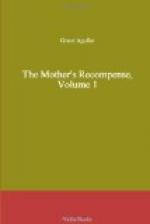It was evident this morning that the efforts of the young lady had not succeeded quite so well as usual in veiling the discontent in which she inwardly indulged. She was amusing herself at that moment in opening every book on the table, glancing sulkily on their contents, and then throwing them down again with a violence that not only had the effect of making her mother start, but of disturbing the quiet repose of some of the fragile toys in their vicinity, to the manifest danger of their destruction.
“I wish you would oblige me, Annie, by endeavouring to amuse yourself in a quieter manner,” observed her mother, in a very languid tone. “You have no pity on my poor nerves. You know when I have these nervous headaches, the least thing disturbs me.”
“You may be certain, mamma, it is reading that makes them worse, not my noise. You had much better put away the book, and then you have some chance of being free from them.”
“Will you read to me then instead? I assure you I should much prefer it.”
“I read aloud! I could not do it to please the most agreeable person in the world; and as you are so very obliging to me in refusing so decidedly to go with me to-night, you cannot expect I should oblige you.”
Lady Helen Grahame’s placid countenance gave no evidence of inward disturbance at this undutiful speech; she was too much used to it, to feel the pain it might otherwise have produced, and too indifferent to be either indignant or displeased.
“You are very ungrateful, Annie,” she replied, in that same languid tone, but with the very little expression in her voice, no emotion was visible. “I tell you I will send round to Lady Charlton or the Countess St. Aubyn; either of them, I know, will be very happy to chaperon you. Surely you can let me be quiet for one evening.”
“Lady Charlton I cannot bear; she is the most detestable creature I know. I would rather be buried alive in the country, than join in London society under her care; with her long speeches of prudery and virtue, and the modest reserve of young ladies, and a hundred other such saint-like terms, when all the time she is doing all she can to catch husbands for her three great gawky daughters, who in mamma’s presence are all simplicity and simper—sweet girls just introduced; when I am very much mistaken if the youngest is not nearer thirty than twenty. And as for Lady St. Aubyn, you know very well, mamma, papa declared I should never go out with her again; it is just the same as if I were alone. She has not a word or thought for any one but herself: she thinks she may act with as much coquetry now as before she married. I do believe that woman only married that she might be more at liberty and go out by herself.”
“Then, if you like neither of them, write a note to Mrs. Hamilton. Your father would be better pleased if you were to go under her care, than of any other.”
“Mrs. Hamilton! I would not for worlds. Every pleasure I might otherwise enjoy would vanish before the stern majesty of her presence. I wonder how Caroline can bear the thraldom in which her mother holds her—it is complete slavery.”




